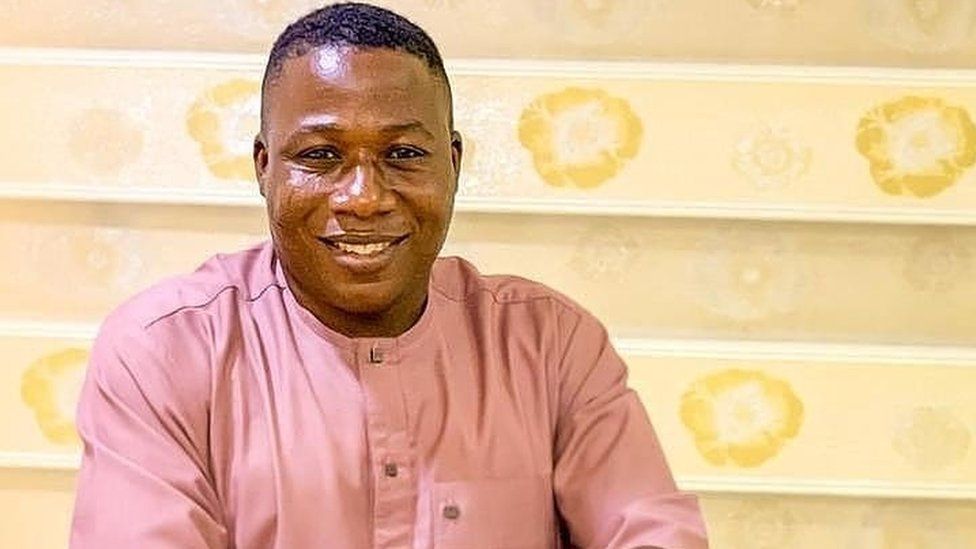A Benin court ordered that Nigerian separatist leader Sunday Adeyemo be moved from police custody to prison.
Sunday Adeyemo, also known as Sunday Igboho, is accused of entering the country illegally and planning to cause trouble but he denied the charges.
He was arrested at a Benin airport last week at Nigeria’s request.
But the Nigerian authorities have been silent since his arrest and have not made a formal extradition request.
Instead, he is now being investigated in Benin for criminal associations there and he made a second court appearance in Cotonou on Monday.
Arrested in Benin
He was arrested in Benin just over a week ago alongside his wife. She has now been released.
Reports say they were headed for Germany where his wife is a citizen.
Nigeria accuses Mr Adeyemo of stockpiling weapons, calling for the break-up of the country, and inciting ethnic killings.
But his supporters say he is a political prisoner who is being persecuted for defending his Yoruba people who are being attacked by some Fulani herdsmen.
Fleeing Nigeria
He fled the country after a raid on his home by Nigeria’s secret police in early July where two of his associates were killed.
Twelve others who were arrested during the raid have not been taken to court.
In recent weeks, Nigeria has been cracking down on separatist activists. In late June, Nnamdi Kanu, who wants a breakaway state of Biafra in the south-east, was detained in Nigeria.
He was arrested in an unnamed foreign country and brought back to Nigeria.
His lawyers allege he was abducted in Kenya where he was tortured but the authorities there have denied the accusations.
Will he be extradited to Nigeria?
Mr. Adeyemo’s legal team says Nigeria was hoping for a repeat of the swift extradition of their client when he was arrested in Cotonou. They say that a private jet was fuelled and ready to fly him across the border.
But unlike in Mr. Kanu’s case, the authorities in Benin have got involved.
A 1984 extradition treaty between West African neighbors: Nigeria, Togo, Benin, and Ghana, excludes those wanted for political reasons.
Mr. Adeyemo’s representatives argue that he falls within this category as his clamor for self-rule is protected under the charter of the African Union (AU).
Also, Nigeria and Benin are part of the 15-country Economic Community of West Africa States (Ecowas), a regional body with far-reaching laws on trade and legal matters.
Under the Ecowas extradition convention which is binding on Benin, there must be a request from a member country setting out the offenses against a suspect wanted in their home country.
Only a court can then decide the extradition request.
Extradition request
But Nigeria has been accused of trying to arm-twist its smaller West African neighbor into releasing Mr. Adeyemo without making its case in court.
Prominent Nigerian lawyer, Femi Falana, told the BBC that the Nigerian embassy wrote a letter to the authorities in Benin requesting the extradition of Mr. Adeyemo. But this was not part of a legal process.
“The Nigerian government had asked outside the law,” he said.
He believes Nigeria, which dwarfs Benin in size and economy, was trying to use its political influence to have the suspect returned.
Nigeria-Benin relations
Both countries share a border which Nigeria unilaterally closed in August 2019, accusing its smaller neighbor of encouraging smuggling of banned items into the country.
The border closure sent ripples through West Africa and forced Benin’s President Patrice Talon to make a visit to the Nigerian capital, Abuja, to appeal for a reopening.
The border remained closed until early this year.
Mr. Falana also believes that Mr. Adeyemo’s case is proving that there is plenty for Nigeria to learn from its smaller neighbor in the matter of human rights.
“His wife who was arrested with him was released by the court because there was no case against her,” said Mr. Falana.
He contrasted that with the situation in Nigeria where several weeks after 12 people were arrested during the raid on Mr. Adeyemo’s home they have not been taken to court.






